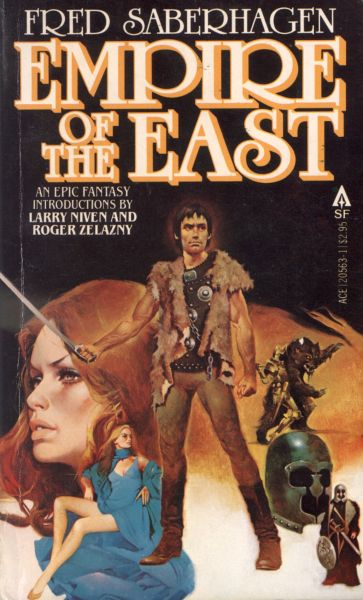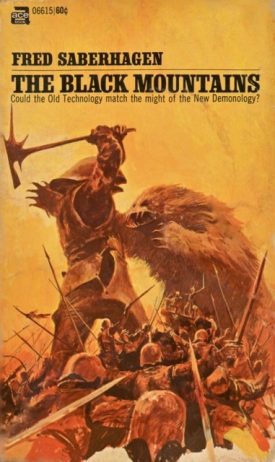Hope Never Dies
Empire of the East
By Fred Saberhagen

9 Jul, 2023
1979’s Empire of the East is an omnibus edition of Fred Saberhagen’s Empire of the East trilogy1. The individual novels included are The Broken Lands (1968), The Black Mountains (1971), and Ardneh’s World2 (1973).
As was the custom in those days, the 1979 omnibus has glowing introductions from two luminaries of the field, Larry Niven and Roger Zelazny. Niven liked Empire of the East more than Lord of the Rings, although he admits it’s a matter of taste. Zelazny is more detailed in his praise, singling out details of Saberhagen’s writing as particularly worthy of praise.
Thousands of years after the Old World’s fall, the malevolent Empire of the East invades and conquers the West. Only a remnant of free men remains. Is hope dead?

The Broken Lands (1968)
Returning home to find his parents murdered and his adopted sister Lisa carried off by the Satrap Ekuman’s soldiers, Ralf is consumed with a desire for vengeance. He soon falls in with like-minded freedom fighters. However, their shared determination is as nothing in the face of the Empire’s dark magic. Some equalizer must be found.
Remnants of the Old World technology remain. Elephant is one such, a surprisingly durable artifact that the Empire is ill-suited to face. While Elephant’s existence is known, its location is unclear. Can the rebels find Elephant before the Empire does and if they do, who among them can master Old World weapons?

The Black Mountains (1971)
The Empire’s defeat is but a minor setback as long as the Empire has demons like Lord Zapranoth to serve it. Even vanquished warriors such as Lord Chup, crippled in the first volume, may be restored to serve the Empire once more. Given time to regroup, the Empire will resume its inexorable conquest of the world.
The flaw in the plan is Lord Chup, who despite having known nothing but the Empire’s malevolence, has tired of cruel decadence. Zapranoth may see Chup and Chup’s beautiful but treacherous wife Lady Charmian as mere playthings to be corrupted and discarded once the demon grows bored. Chup has different plans entirely.

Ardneh’s World3 (1973)
Lord Zapranoth may have perished at Lord Chup’s hands but Emperor John Ominor and his legions of obsequious wizards and warlords still possess occult weapons that the West cannot match. Should these prove insufficient, the Empire has bound Orcus, oldest and greatest of all the demons, to its will.
The West’s prospects would seem gloomy had it not its own great ally. Ardneh has guided the West throughout the war. Now it will face the Empire itself. This may seem a recipe for disaster — if Ardneh falls, surely so must the West — were it not for the secret of Ardneh’s true nature.
~oOo~
My edition has poorly reproduced interior frontispieces for each section, artist unattributed.
If I might complain about an aspect of the setting beyond the borders of this narrative, it annoyed me to no end to discover from the Book of Swords series (set in the same world many years after Empire of the East) that humans are apparently doomed to domination by one set of magical beings after another.
Lord Chup is relentlessly pragmatic, with a single exception. His devotion to his chaotic evil wife never wavers, even as he fends off her endless attempts to betray him to win higher social rank. His survival is thanks to the fact he has no illusions about Lady Charmian. His refusal to spurn her despite her efforts to kill him or worse takes on a comic air, or at least it did for me.
Niven and Zelazny to the contrary, Saberhagen’s prose is at best workmanlike, sufficient to convey the various elements of the story without being particularly memorable or evocative. Saberhagen does not hesitate to resort to lengthy infodumps to provide necessary backstory. One might describe Saberhagen’s writing skills as “sufficient.” The unkind might describe this series as relentlessly mediocre.
Likewise, the worldbuilding is somewhat inconsistent, unless “whatever is needed to keep the plot moving is true” counts as worldbuilding. In particular, the events of book one should have impossible given what Ardneh claims in book three. Also, I don’t think Saberhagen understands how long 50,000 years is; not only do current names survive, but there’s a complex bit of still functional machinery that probably should have become a lump of corroded metal by Rolf’s time.
Which isn’t to say there are no some nice bits. Saberhagen enjoys exploiting easily overlooked implications of magic for plot twists. The bad people are very bad. The good are very good. At no point is there a painful multivolume digression in which it is clear the author has lost control of the plot.
Contrary to recent complaints on my part about reading long books, I read all 558 pages of this novel in one lazy afternoon. In part, this may be because each of the novels that comprise the omnibus are quite short. In part it may because they are also, to put it nicely, straightforward. This is not a book that demands cognitive heavy lifting, merely a facility for swiftly flipping pages. Which I have.
Empire of the East is available here (Amazon US), here (Amazon Canada), here (Apple Books), here (Barnes & Noble), and here (Chapters-Indigo).
The individual titles that comprise Empire of the East are available on Amazon UK here, here, and here.
1: Ardneh’s Sword, the fourth volume of the trilogy, was omitted not because publishers delight in awkwardly packaged omnibuses, but because it was not published until 2006, decades after Empire of the East.
2: Originally titled Changeling Earth.
3: Yes, the series jumped publishers in mid-stream.
